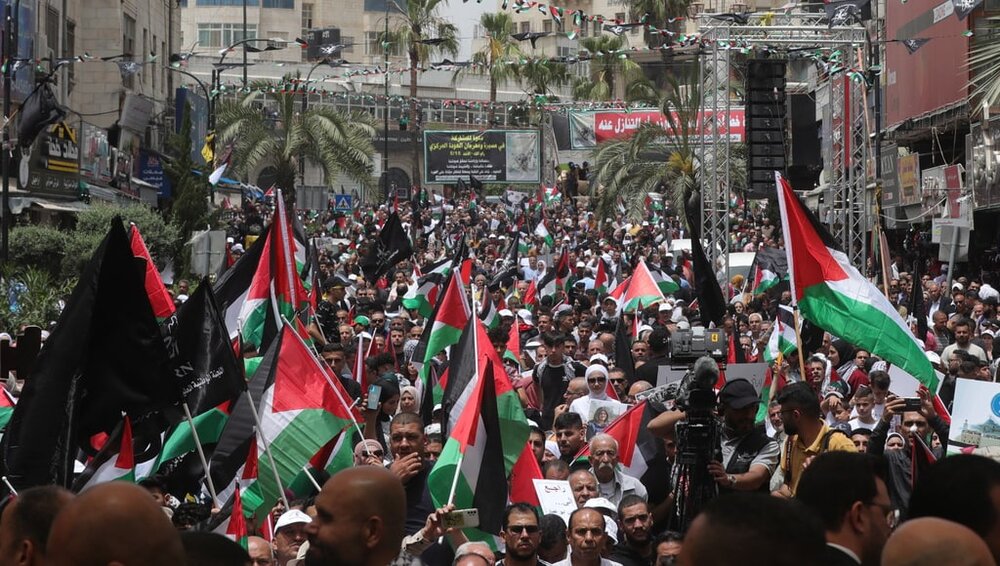Nakba Day: 74 years of repression

TEHRAN – Thousands of Palestinians took to the streets in the Gaza Strip and the West Bank as well as other parts of the world to remember a disaster that took place decades ago and never really came to an end.
The occasion, known as Nakba Day, marks the establishment of Israel as a “Jewish-majority state” at the expense of the near-total destruction of Palestinian society.
Nakba translates to “catastrophe” in Arabic, which demonstrates how Palestinians feel about the emergence of Israel. The day in question is May 15, 1948, when the establishment of Israel resulted in the forced expulsion of 750,000 Palestinians, two-thirds of the Palestinian population at the time.
More accurately, Nakba is a period of systematic ethnic cleansing of Palestinians by Zionist paramilitaries between 1947-1949.
Zionist forces had taken more than 78 percent of historic Palestine, ethnically cleansed and destroyed about 530 villages and cities, and killed about 15,000 Palestinians in a series of mass atrocities, including more than 70 massacres, according to Al Jazeera.
Millions of Palestinians were also either internally displaced or forced to flee historic Palestine, creating Palestinian refugee camps in all neighboring countries and strong Palestinian diaspora communities almost in all Western and most non-Western countries.
Many nations in the world have experienced periods of agony and displacement but Palestinians are the only nation whose plight never ended and continued to this day. Some pundits believe that amounts to “intergenerational trauma.”
“There isn’t one Palestinian family that has not been impacted by the Nakba. Unfortunately, we are transferring intergenerational trauma to our children,” Honaida Ghanim, the general director of the Palestinian Forum for Israeli Studies, told Al Jazeera. “We wish we were commemorating what happened in 1948, but it is an ongoing feeling where you cross checkpoints and face the brutality of the military Israeli occupation through daily destruction, house demolitions, and ethnic cleansing.”
She noted the grave injustice the Palestinians are suffering. “It is the ongoing injustice where Jews from anywhere can come and live in Palestine whereas Palestinians refugees cannot even visit,” Ghanim said.
Over the last seven decades, Israel has rejected all peace initiatives and worked to render moot any potential peace plan by continuing to expand its borders both into neighboring Arab states and Palestinian territories. Israel used to occupy Egypt’s Sinai Peninsula and still occupies Syrian and Lebanese territories in addition to its occupation of vast Palestinian territories in the West Bank.
Meanwhile, Israel has rejected and continues to reject, all efforts aimed at finding a solution to the plight of Palestinians. It has rejected the Western-backed two-states solution. Over the years, Israel made its top priority to ensure that the two-state solution is dead. Israel hugely undermined this solution by moving ahead with its settlement construction plans in the Palestinian territories.
On the other hand, Israel also vehemently opposes the one-state solution with equal rights for Jews, Muslims, and Christians. In a blow to the one-state solution, the Knesset passed a controversial law in July 2018 stipulating that Israel is a “Jewish state,” effectively turning Israel’s sizable Arab Palestinian population into a second-class citizen.
Israel has opposed the democratic solution proposed by Iran which calls for a referendum among the indigenous people of Palestine to determine their future.
Rejecting all solutions, Israel continues to repress Palestinians, with the killing of veteran AL Jazeera correspondent Shireen Abu Akleh in Jenin, the West Bank, being the latest case of Israel’s state-sponsored violence against Palestinian civilians.
Leave a Comment